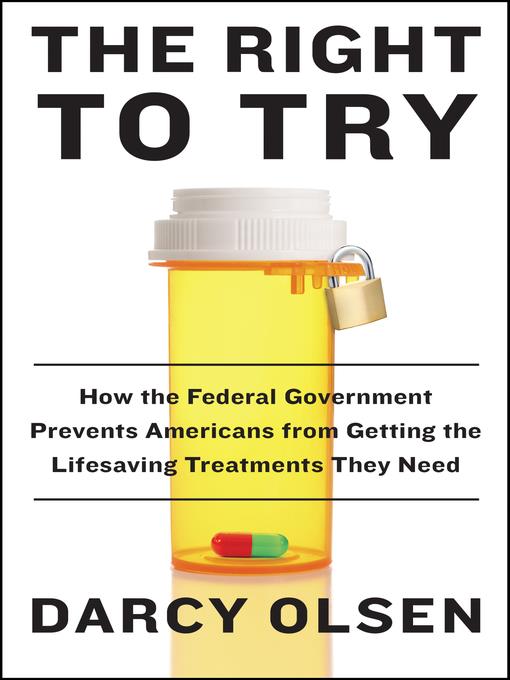
The Right to Try
How the Federal Government Prevents Americans from Getting the Life-Saving Treatments They Need
چگونه دولت فدرال از آمریکاییها برای گرفتن درمانهای نجات که به آن نیاز دارند، حمایت میکند؟
کتاب های مرتبط
- اطلاعات
- نقد و بررسی
- دیدگاه کاربران
نقد و بررسی

September 15, 2015
The president and CEO of the Goldwater Institute makes a convincing case that the slow pace of the Federal Drug Administration's development and approval process for new medications is needlessly costing lives. Throughout this forceful book, Olsen cites troubling statistics that underscore the depth of what she claims is a worsening problem. "The FDA," she writes, "takes as long as 15 years to bring a new medicine to market and Americans are now waiting 60 percent longer for the FDA to approve life-saving medical devices-such as stents and valves-than they did just seven years ago." This is particularly disturbing in the case of patients with serious illnesses who are denied access to promising new treatments. According to the author, one cause of the problem is asymmetry in the approval process. The FDA is incentivized to be overcautious. If someone dies after undergoing a new treatment approved by the agency, there is a scandal; however, there is insufficient attention paid to deaths attributable to delayed approval. "Instead of speeding medical innovation," writes Olsen, "the FDA is slowing it down-demanding more data, more tests, and more procedures on more subjects before it will approve a drug." In some cases, of course, more data and more tests are warranted. But though "American patients used to be the first to benefit from their country's enormous investments in basic medical research," that is no longer the case. The author presents case histories of patients fortunate enough to be enrolled in FDA-approved trials, many of whom experienced remarkable cures. For terminally ill patients, the odds that an experimental drug will help, though as low as 20 percent, may still be attractive. Olsen's organization is leading a bipartisan campaign to pass Right to Try legislation allowing patients and their doctors to bypass FDA regulations in deciding whether or not to try experimental treatments and for drug companies to make them available on a compassionate basis. High-quality advocacy certain to stir debate.
COPYRIGHT(2015) Kirkus Reviews, ALL RIGHTS RESERVED.

October 15, 2015
Should people suffering from incurable diseases be allowed to decide (along with their doctor) whether to undergo treatment with experimental drugs that have been proven safe? Or is it prudent for the Food and Drug Administration (FDA), through its regulatory process, to exert authority over that choice? Olsen, who is affiliated with a conservative policy and legal organization, advocates a Right to Try law allowing terminally ill Americans access to potentially life-saving new medications stuck in FDA limbo. Already, such legislation has been passed in more than 20 states. Olsen shares the tragic and heroic struggles of patients and families understandably desperate to obtain FDA-unapproved investigational treatments, including a boy with osteosarcoma who must move to England to receive immune therapy, a man with ALS getting stem cell injections, a middle-aged woman with multiple myeloma treated with measles virus, and brothers with Duchenne muscular dystrophy. All medical treatments require balancing risk and reward. Olsen makes a compelling case that patients with fatal illnesses have a moral and should have the legal right to choose their courses of medical action.(Reprinted with permission of Booklist, copyright 2015, American Library Association.)

























دیدگاه کاربران